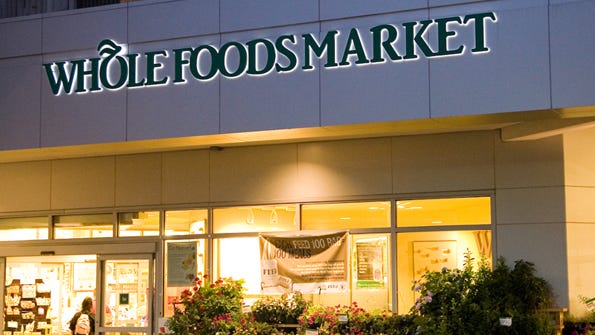
 Whole Foods Market beat analysts’ expectations and recorded record sales in the fourth quarter of FY2014, delivering some much-needed good news to investors on Wednesday’s earnings call.
Whole Foods Market beat analysts’ expectations and recorded record sales in the fourth quarter of FY2014, delivering some much-needed good news to investors on Wednesday’s earnings call.
It’s been a challenging year for the upscale grocer, as it’s faced intense competition in the natural retail space and has seen its stock fall more than 30 percent over the last year. But co-CEOs Walter Robb and John Mackey suggested some of the initiatives Whole Foods undertook this year, including a partnership with one-hour grocery delivery service Instacart, a price-cutting trial in some of its Texas stores and an aggressive expansion plan, gave the numbers a boost:
Record fiscal year sales of $14.2 billion in FY2014, up 10 percent from the prior year.
Fiscal year earnings per share were $1.56, compared to $1.47 last year.
Prepared foods and bakery department sales totaled $2.7 billion, or 19 percent of overall sales.
13 new store openings in Q4, and 38 in the fiscal year.
“As we accelerate our growth, we are evolving and differentiating our shopping experience faster than ever before,” Robb said. Early customer response to integration with Instacart in 15 U.S. cities has been “overwhelmingly positive,” he added, resulting in orders “2.5 times our average basket size.” Whole Foods also launched a new affinity loyalty program, which has now expanded to 11 stores.
Robb said the upscale grocer will continue to make technology investments, with plans to introduce a new Whole Foods Market app this year and to roll out the loyalty program to stores nationwide by the end of next year. It’s also launching a wine club that will offer home delivery of wines from around the world.
Riding the momentum of a record number of new stores this year, Whole Foods also plans to expand into six new markets in 2015 and update 70 percent of stores that are 10 years or older.
“One of our many competitive advantages is our ability to create unique community gathering places, such as the rooftop Tap Haus in our new Asheville store and our At the Turn outdoor venue next to a five-hole putting green in our first Augusta, Georgia, store,” Robb said.
Meanwhile, the grocer will continue working to emphasize its focus on providing quality food, as it’s done with a national “Values Matter” ad campaign and a new produce ratings system. Mackey said he was disappointed that GMO labeling measures in Oregon and Colorado did not pass, but that it would not derail the retailer's plans to require brands to have GMO transparency by 2018.
Company officials said they expect store sales growth in the low to middle single digits this year and a slight decline in gross margin.
About the Author(s)
You May Also Like
.png?width=700&auto=webp&quality=80&disable=upscale)




